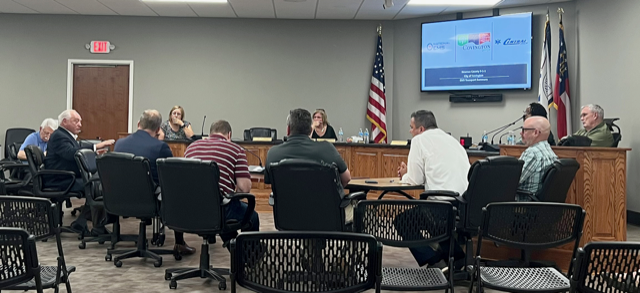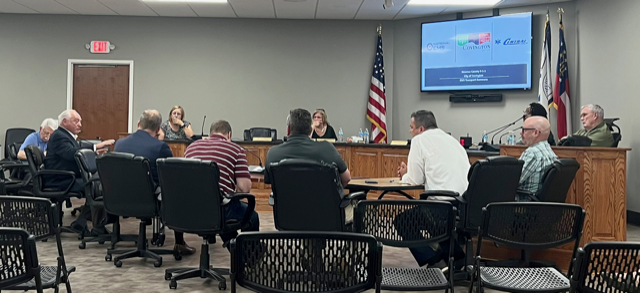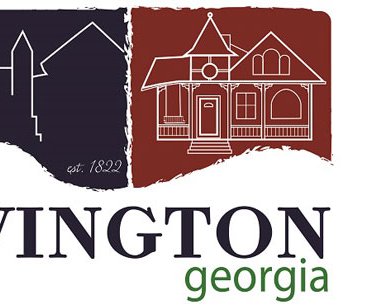COVINGTON, Ga. — On average, there are about 500 calls for EMS services in the city of Covington, and while the majority may end well, city officials believe there are too many that do not.
Members of the Covington City Council and city government staff, including the fire department, met Tuesday, May 24, with officials of Piedmont Newton Hospital and National EMS to discuss a variety of issues plaguing the current quality of ambulance services and how the organizations could collaborate to find solutions.
Piedmont Newton Hospital is currently the zone license holder for EMS services in Newton County, and has been for several decades — predating the hospital’s sale to Piedmont in 2015.
For several years the county government held the license until 1972 when they entered into a contract with then Newton General Hospital to provide the service, according to City Attorney Frank Turner Jr. The service was funded through a subsidy from the county collected from taxpayers as part of the property taxes. When the hospital sold to Piedmont, Turner recalled, the county’s Board of Commissioners no longer wanted to subsidize the service. When hospital officials heard this, they considered turning back over the license to the county. However, when the county explored contracting services with Grady Hospital, Piedmont officials changed their mind and agreed to provide the service without a subsidy.
“In 2018, Piedmont entered into a 50-year contract with the county that Piedmont would be the ambulance service provider for the county,” Turner said. “So until 2068, Piedmont is contracted with the county to be EMS provider and provide sufficient EMS personnel to provide that function.”
As part of the agreement, Piedmont does have the right to subcontract the services, which it has done.
Piedmont Newton Hospital entered a contract agreement in 2021 with National EMS through parent company Priority Ambulance, the state’s largest private ambulance network. Priority Ambulance also owns Central EMS.
In an April 2, 2021, report from The Covington News, Priority Ambulance officials said they would buy seven ambulances from Piedmont Newton and would “maintain the staffing levels currently in the 911 system — five advanced life support ambulances during peak daytime hours” — as part of the agreement. Separate from ambulances dedicated to the 911 system, Central EMS would station additional ambulances at the hospital “to immediately respond to transport requests between medical facilities or discharges from the hospital,” per the report.
National EMS is also the 911 provider to neighboring Rockdale and Morgan counties.
More than one year later, city council members have voiced their displeasure with the quality of National EMS’ services and are urging health care executives not only to take note but ensure change.
Among several issues to make the hour-long discussion was sub-par response times, a shortage of ambulances and a lack of personnel for each unit.
Since the pandemic and now what many consider an uncertain economy, Priority Ambulance Leadership Foundation Board of Directors member Gary Coker said most problems facing Covington, and Newton County as a whole, were issues being seen nationwide.
“There are staffing shortages for ambulance services; staffing shortages of EMTs; staffing shortages of paramedics; just as there are staffing shortages for nurses and other medical [roles] throughout the hospital,” said Coker, who is former CEO and owner of Central EMS. “These challenges existed before COVID came, and now as COVID has gone — though not quite gone, at least it’s better than it was — it exaggerated these challenges, and so what you’re seeing are some of those things coming out.”
Coker said he had “open ears” to hear thoughts and potential solutions on all issues facing the community in order to better serve the area. But he said he was also proud of the way they’ve been able to make things work in spite of staffing issues.
“Even though we’ve had some challenges — and I understand those challenges — I’m really proud of what we have in the records of running calls here in the city,” he said. “There’s probably about 500 calls in the city per month and, out of the 500, so many of them go right. And I know we’re going to talk about the ones that didn’t go right, and that’s OK. But I think you need to keep in mind, too, just how many went right and what was done correct in how we’re doing it.”
The approximate total of 500 calls per month was for the city of Covington alone, Coker said. According to the 2020 annual report from the Covington-Newton County 911 Center, that would equate to about half of the county’s total EMS calls for service.
Approximately 13,538 EMS calls were generated for Piedmont Newton EMS, based on the 2020 report. A 2021 report had not been published at the time of this publication.
Covington Fire Department officials said they meet monthly with National EMS to review response times and go over issues, as the two organizations often work hand-in-hand.
But while response times are continuing to improve, Covington Fire Department officials said there are times when not enough paramedics are on the ambulance. There are also times when a call for service is requested, and there simply aren’t enough ambulances available.
Fire Chief Jeremy Holmes said there was a recent incident in which a pedestrian was stuck by a vehicle on the Covington Square. An ambulance did not arrive until about 45 minutes after a call for service was made.
“I think part of the frustration level is that we’ve all been affected personally by a call that we’ve failed,” Holmes said. “I just hear it often — multiple times from multiple people, saying ‘I was sick and couldn’t get an ambulance,’ or ‘My mom, dad, [grandparents] were sick and couldn’t get one.’ That’s building, and those conversations are repeated a lot.”
Holmes said a lack of available paramedics was putting more responsibility on his crew. When a crew responds to a scene and they learn no paramedic is on the National EMS unit, Holmes said the Covington Fire Department paramedic on the truck becomes responsible for that patient.
“It leaves our people left facing decisions and put in positions they shouldn’t have to be,” Holmes said.
Councilman Don Floyd also felt this was a major issue that, if unresolved, could leave the city open to potential legal trouble.
Coker said National EMS works to keep four and a half ambulances on the road at all times — meaning four are supposed to be in operation 24/7, and one ambulance is on the road Monday-Friday during the “peak times.”
Coker said the local ambulance service did drop to only three ambulances on the road at one time, but that was due to COVID, which “killed us for a certain period of time because paramedics and EMTs would have to stay out” for specific amounts of time to meet protocol.
“We’ve got a system here [in Newton County] unlike most counties,” Coker said. “We have National EMS that covers for [the 911 system], and all National’s ambulances do are 911, or sometimes a critical emergency out of the hospital. They’ll transport that emergency case. But they are not used to transport someone from the hospital back to a nursing home. For those instances, there are a separate set of ambulances from Central EMS that focus on hospital-to-hospital transfers.
“If only three ambulances [are available in the 911 system], Central EMS has a unit [that changes its] first priority [to serve the 911 system] and emergency cases,” he said.
But, Covington Fire Department officials said Rockdale units had to aid Newton 29 times last month because there were no ambulances available in Newton. Walton units came to aid about [seven] times.
Councilwoman Fleeta Baggett disagreed with Coker because, based on numbers she had been given, there have been times when only two or three ambulances were running in Newton County. She said there were occasions when only one paramedic was running in an SUV between three counties, including Newton, Henry and Walton.
“I think the bottom line is money,” Baggett said. “I would like to see the contract. I don’t know if you’re willing to show us the contract. And if it’s that big of a deal, then give the license back to the fire department. Turn it back over.”
Piedmont CEO David Kent then said he would “be happy to consider” relinquishing the license. He said the hospital had only retained the license because they felt it was the “right thing to do, to stay involved.”
Because of the personnel shortage, Baggett said people were essentially left to die because “right now the people who are running the trucks are [like] Uber drivers.”
Baggett said she was appalled by the lack of timely, quality service when she suffered a heart attack a few months ago.
“I would be dead right now if not for that man back there,” she said, pointing to her brother, Chris Smith. “I’m fortunate enough to have my own paramedic in my family. Not everybody is.”
While in the emergency room, Baggett said she was told she would have to wait about 50 minutes before the next ambulance could take her from Piedmont Newton Hospital to Piedmont Rockdale — about an eight-mile trek.
“That’s unacceptable,” she said. “I don’t want to hear that the other 490 calls went great. You don’t care if you’re one of the 10 that it didn’t.”
Councilwoman Charika Davis also didn’t appreciate Coker’s comments concerning the number of calls that went right versus the number of calls that failed.
“These are people,” Davis said to Coker. “This is not internet service that we’re dealing with where you’ve got 40 people — 25 people whose internet went down. These are lives that are stake and you’re treating them like they’re nothing. It’s a numbers game with you, and it is for profit. And the people who are suffering are the citizens in Covington. You don’t care. No empathy.”
Coker rejected Davis’ claims of a lack of empathy by saying he does care and pointed to the fact he’s “spent a lifetime in this industry” as proof.
To address the paramedic shortage, Coker said National EMS puts paramedics in a vehicle at times so they could go to any basic ambulance in need of a paramedic.
“And that’s because of staff shortages,” Coker said. “That’s not because we want to do that. That’s not our objective. It’s certainly not because we’re trying to pay less for the EMT to run than the paramedic. We have the budget there ready and set to go. It’s simply because we can’t get enough people in to work.”
When asked how short staffed they were, Coker said they were only able to staff two people per unit and unable to fill the paramedic role on all of them. He said they could fill the role on three units “almost all of the time” but were unable to the fill the others, except on some days. When not filled, they place an advanced EMT on the unit.
However, EMTs are limited in the care they can provide in comparison to a paramedic.
“A paramedic is able to do much more on a higher level,” he said. “Paramedics are in short supply right now, and that’s a challenge.”
“We have the vehicles, and we have the ambulances,” Coker added. “We need to get the people here.”
To help grow the personnel pool, Priority Ambulance offers company sponsored academies to train and certify employees. As part of the program, EMTs and paramedics must work out a contract for a specific period of time in order to take advantage of course funding/tuition. However, the new EMTs and paramedics are allowed to choose where they want to work, leaving no guarantee that anyone is stationed in Newton County.
Baggett said officials should consider restructuring the contracts to have EMTs and paramedics work in assigned locations.
In addition, helping the personnel shortage could only require more money. Keck suggested Coker and his company figure out a way to pay more and even give retention bonuses — do something to keep them from leaving.
However, it isn’t all about money. Coker said another factor was location and what type of environment they wanted to work in.
In seeking a solution to better serve the city, Holmes asked what it would take to have two additional ambulances designated for only the city of Covington.
Coker estimated it would cost about $800,000 annually per ambulance, but the cost would be offset by revenue generated from calls. Revenue is only generated by transporting patients.
The idea behind getting two ambulances would be to have one that could be used for required mutual aid situations and allow the other ambulance to be contained for city use at all times.
Coker said he would need to double check to make sure that was possible from a legal standpoint.
Based on past experience, Coker presumed the city would be unable to obtain a separate license to allow it to operate ambulances on its own. The city could, however, contract with the hospital to get city-specific services.
All parties agreed to reconvene in about 30 days after looking at budgets, further analyzing issues to identify specific problems, and coming up with potential solutions.
Before they adjourned, Smith addressed the city and health care officials with advice of caution as well as a plea for action.
If the city chose to enter an agreement to get their own ambulances, Smith urged the city to make sure any mutual service agreements to be made “tight” and not one-sided.
“It’s something that the community is really in dire need of,” Smith said.
“We’ve got to do something. We’ve got to do a better job of having an EMS service here that we can all be proud of, and that we know if we call 911, we know somebody is coming. Because right now, I caution my friends and family trying to activate 911 to need an ambulance.”
Covington City Councilmen Anthony Henderson and Kenneth Morgan did not attend the meeting.





